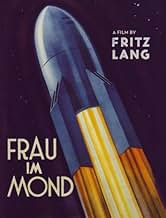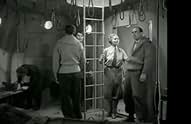PUNTUACIÓN EN IMDb
7,2/10
4 mil
TU PUNTUACIÓN
Un tenaz científico parte hacia la Luna con la esperanza de encontrar allí riquezas.Un tenaz científico parte hacia la Luna con la esperanza de encontrar allí riquezas.Un tenaz científico parte hacia la Luna con la esperanza de encontrar allí riquezas.
- Premios
- 1 nominación en total
Gustl Gstettenbaur
- Gustav
- (as Gustl Stark-Gstettenbaur)
Gustav von Wangenheim
- Hans Windegger - Engineer
- (as Gustav v. Wangenheim)
Alexa von Porembsky
- Eine Veilchenverkäuferin
- (as Alexa v. Porembska)
Heinrich Gotho
- Der Mieter vom II. Stock
- (as Gotho)
Alfred Loretto
- Zwei eindeutige Existenzen
- (as Loretto)
Max Maximilian
- Grotjan, Chauffeur bei Helius
- (as Maximilian)
Edgar Pauly
- Zwei eindeutige Existenzen
- (as Pauly)
Karl Platen
- Der Mann am Mikrophon
- (as Platen)
Mahmud Terja Bey
- Fünf Gehirne und Scheckbücher
- (as Terja Bey)
Hermann Vallentin
- Fünf Gehirne und Scheckbücher
- (as Vallentin)
Argumento
¿Sabías que...?
- CuriosidadesThis film shows the first countdown to the launch of a rocket - not just the first one in a movie, but the first ever. It was invented as a dramatic device for the movie. Previously, all launches were begun with a count upward from zero to a designated number (usually ten). Also depicted for the first time are the use of liquid rocket fuel, a rocket with two stages, and zero gravity in space.
- PifiasWhen Helius listens for Friede's heartbeat, fearing that the launch may have killed her, we can see her breathing heavily.
- Citas
[Opening intertitle]
The Author: "Never" does not exist for the human mind... only "Not yet."
- Créditos adicionalesFritz Rasp is billed in the opening credits as "Der Mann, der sich Walter Turner nennt" or "The man who calls himself Walter Turner."
- Versiones alternativasThe film was given a release from Kino Internation on DVD, running a length of 169 minutes. The 2000 restoration runs 200 minutes. The original showing in the United States ran 156 minutes and was later cut to 95 minutes.
- ConexionesEdited into Histoire(s) du cinéma: Le contrôle de l'univers (1999)
- Banda sonoraHeimlich singt für uns die Liebe
Music by Willy Schmidt-Gentner
Lyrics by Fritz Rotter
Sung by Gerda Maurus and Willy Fritsch
Reseña destacada
As Martin Sheen said in the fine documentary "Space," this movie deals seriously with almost every aspect of a flight to the moon. It makes some dreadful errors that, even in 1929, could and should have been avoided (an atmosphere on the moon, for example). But, it nevertheless treats the subject and the viewer with respect. When I saw this movie at a New York revival house, a live pianist provided the silent film's accompaniment. I encourage you to see it this way, as that somehow made it even easier to put myself in the place of an early 20'th century filmgoer, and see this fine movie for what it was. The story is light, but the beckoning mystery of outer space is captured in a way that will make you feel you know something more than you used to about the people who made, and first saw, these images. And, when you do, remember that real space flight was 30 _years_ away. (Later, you might ponder that the first lunar landing is now _more_ than 30 years ago, but do that after you enjoy this sweet look at, as Fred Pohl put it in another, related, context, "the way the future was.")
One extra bit of advice: Keep your ears open at the moment of launch. All of the effects in this movie are, naturally, simple and gray-haired. Nevertheless, when the rocket actually took off, my audience gave an audible reaction because, I think, Lang decided to emphasize an aspect of what a rocket is, and what it can do, that virtually all later film-makers have decided to ignore. They should see this movie, and learn a little something.
One extra bit of advice: Keep your ears open at the moment of launch. All of the effects in this movie are, naturally, simple and gray-haired. Nevertheless, when the rocket actually took off, my audience gave an audible reaction because, I think, Lang decided to emphasize an aspect of what a rocket is, and what it can do, that virtually all later film-makers have decided to ignore. They should see this movie, and learn a little something.
- pro_crustes
- 22 jul 2001
- Enlace permanente
Selecciones populares
Inicia sesión para calificar y añadir a tu lista para recibir recomendaciones personalizadas
- How long is Woman in the Moon?Con tecnología de Alexa
Detalles
- Fecha de lanzamiento
- País de origen
- Idioma
- Títulos en diferentes países
- Una mujer en la luna
- Localizaciones del rodaje
- Empresas productoras
- Ver más compañías en los créditos en IMDbPro
- Duración1 hora 44 minutos
- Mezcla de sonido
- Relación de aspecto
- 1.33 : 1
Contribuir a esta página
Sugerir un cambio o añadir el contenido que falta

Principal laguna de datos
By what name was La mujer en la luna (1929) officially released in India in English?
Responde






























